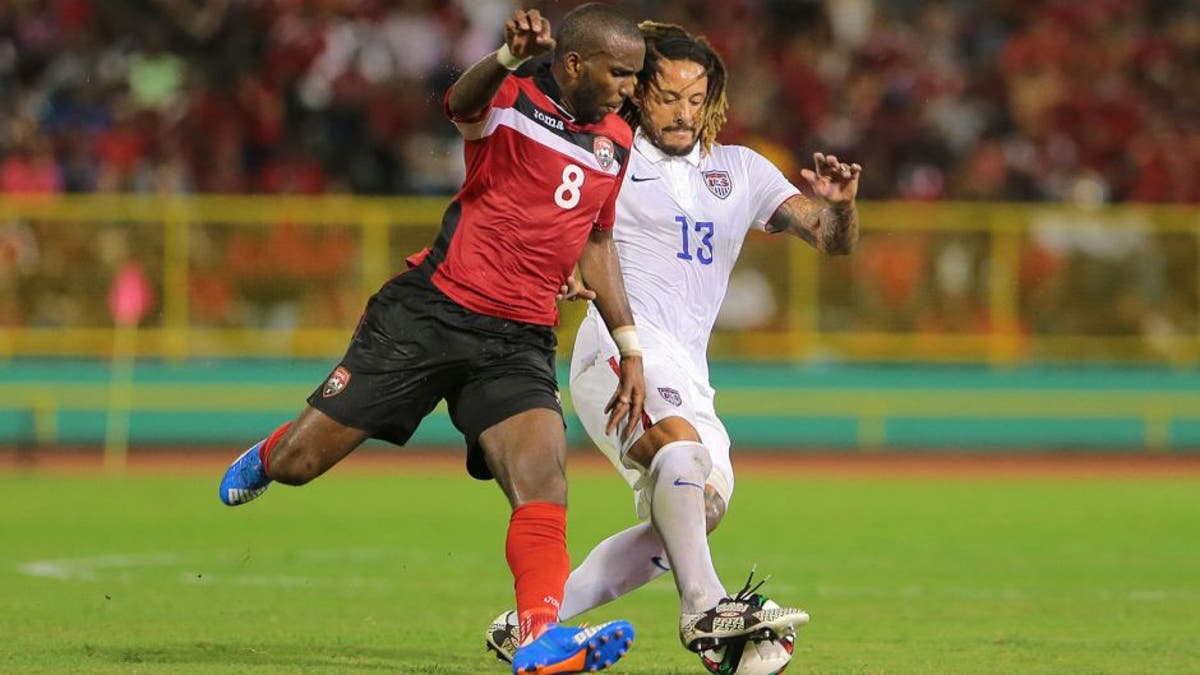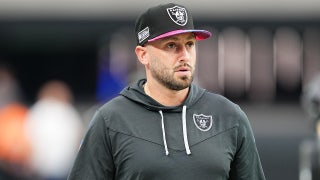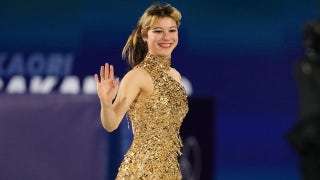
PORT OF SPAIN, TRINIDAD & TOBAGO - NOVEMBER 17: T&T's Khaleem Hyland battles to win the ball from USA's Jermaine Jones #13 during a World Cup Qualifier between Trinidad and Tobago and USA as part of the FIFA World Cup Qualifiers for Russia 2018 at Hasely Crawford Stadium on November 17, 2015 in Port of Spain, Trinidad & Tobago. (Photo by Ashley Allen Getty Images)
PORT OF SPAIN, Trinidad --
There were no illusions within the United States camp ahead of this trip to Trinidad and Tobago. They grasped the stakes. They knew the history of success in Port of Spain and the improvements made by the home side over the past year. They understood the task at hand as they approached it.
"We knew it would be close," U.S. goalkeeper Tim Howard. "We hoped it wouldn't be, but we knew it would be. Like I said, if you win the home game and you get something on the road, then we're in first place. And that's something."
All of those preparations rose to the fore in the 0-0 draw at Hasely Crawford Stadium. This night offered no sweeping step forward or backwards. It supplied a realistic, professional performance instead. There were good spells. There were bad spells. And those particulars paled in importance to the point secured and the perch protected atop Group C after two games.
"It's a great point on the road," U.S. defender Geoff Cameron said. "This is qualifying. This is what happens. They make it difficult when we're playing away. And they did it. They had a great crowd tonight. But, for me, it was a great performance."
Most of the foundation for this result started in the buildup. Trinidad and Tobago presented certain challenges for the Americans to handle. They needed to sort out those concerns first and then figure out their way into the game.
Lineup selection reveals the need for caution
Trinidad and Tobago presents two particular threats: the aerial presence of Kenwyne Jones and the speed in the wide areas. Jones is a case by himself (more on him in a bit), but the wingers required a more considered approach from a selection perspective.
U.S. coach Jurgen Klinsmann reviewed the 6-1 victory over St. Vincent and the Grenadines on Friday and shifted his approach at right back to prepare for those forays. Michael Orozco entered to strengthen the defensive work in that department. DeAndre Yedlin pushed forward onto the right side of midfield. Gyasi Zardes moved up front to partner Jozy Altidore.
"DeAndre -- still with his age -- is better off as a right winger than as a right back," Klinsmann explained. "He still has a learning curve ahead of him as a defender. We all know that. That's why he's learning that every day in the Premier League."
Klinsmann's decision to push Yedlin forward came with some sacrifices -- Orozco isn't going to venture forward much on the overlap -- to keep Fabian Johnson in midfield and strengthen the back four. Those exchanges highlighted the need for solidity. It just took a half-hour or so for them to take hold.
Early stages favor T&T as Americans struggle to settle
Those carefully laid plans nearly disintegrated in the first 30 seconds. Kenwyne Jones stormed up the right and picked out Joevin Jones at the far post. Joevin Jones hit his effort over the bar to underscore the potential menace posed when T&T managed to break quickly.
It took the Americans most of the opening half-hour to navigate their way to a stable place. They didn't display enough sharpness on the ball to carve out possession. They didn't relieve pressure because they lacked the precision to string together the necessary combinations. Jozy Altidore dropped deeper and deeper in a bid to help out, but it took a while for the Americans to devise a more palatable way to manage the game.
"We told the players it's going to be important in the first 15-20 minutes to stay focused and compact," Klinsmann said. "It was very organized and disciplined, what they did. It took us a little bit to find the balance in midfield with Michael [Bradley] and Jermaine [Jones], especially going forward, because they were too often next to each other instead of staggering. We corrected that after about 25 minutes. I told Michael to go higher up. We found better outlets there. The problem was a little bit that we couldn't play into the feet of Jozy and Gyasi. In the first half, they were too far away from each other. They needed to play off each other, which, in the second half, worked out a lot, lot better."
Path to progress starts with collective work on Kenwyne Jones
Most of the progress started by reducing Kenwyne Jones' influence on the game. The inspirational T&T captain played a critical part in that bright start, but he faded from the game after that point. Matt Besler and Geoff Cameron managed the Cardiff City forward well. They competed in the air with him and reduced his operating room. There were no easy flicks, no straightforward ways for him to facilitate the play.
"I think they deserve a huge compliment, both of them," Klinsmann said. "They had Kenwyne Jones pretty much completely under control. Even he's a guy who can score at any moment, especially when you don't expect it. For both, it was a very good performance. They made themselves a strong case, no doubt about it."
Besler and Cameron benefited from Jermaine Jones' presence as a holding player. There were the usual spacing concerns from time to time, but the veteran midfielder stuck to his task in front of the back four and permitted Bradley to orchestrate further up the field. He competed with Kenwyne Jones in the air and restricted the opportunities afforded to Khaleem Hyland, Cordell Cato and Joevin Jones off those vital second balls.
"I thought he did a great job," U.S. goalkeeper Tim Howard said. "Him and Michael, there's always that balance. Depending on the opponent and what the game looks like, one has to hold and one can go forward. I thought Jermaine did a great job. That was kind of a tactic. He's so good in the air. We didn't want to break our back four. We let him compete with the big fella. I thought he did great. Yesterday in training, he was outstanding in the air. We knew he was up for it. Even late on when he had no legs, he made that run to cover. He was fantastic."
Second-half possession allows Americans to assert control …
Once the Americans reduced Kenwyne Jones' ability to serve as a touchstone and sifted out some of their own shoddy touches, they gradually exerted dominion over the proceedings. There were more opportunities to get the ball down, knock it around and manage the tempo of the game. T&T broke forward intermittently, but the Soca Warriors spent much of the second half inside their own half.
Those measures allowed the Americans to improve markedly after the interval and threaten to depart with all three points. Zardes hit the crossbar from close range after an Altidore cross in the clearest chance of the game for either side. There were other flickers from the U.S. after that point, but the progress came from the cadence of the game -- decidedly in the Americans' favor -- and the reduced threat posed by T&T as the match wound to a close.
… and walk away with a deserved point
It proved the proper way to handle this exercise and secure a necessary result. CONCACAF road qualifiers require composure and diligence. Both qualities rose to the fore for this U.S. side. The early period nearly cost them. The second half nearly won them the game. In the end, the point reflected the balanced the way and strengthened their position atop Group C after two rounds.
"These games are always the same," Bradley said. "What makes them different is if you can take your chance. You know they're going to be hard games. You know they aren't always going to be pretty with the conditions and the field. We've been through it before. We know what it's like. If you're able to -- on the day -- take your chance, the result can look different and you can come away with three points. If you don't take your chance, then it's vital that you're defensively solid and you're -- at worst -- able to come out with a 0-0 draw. We did that tonight. In those ways, it was a professional performance."








































